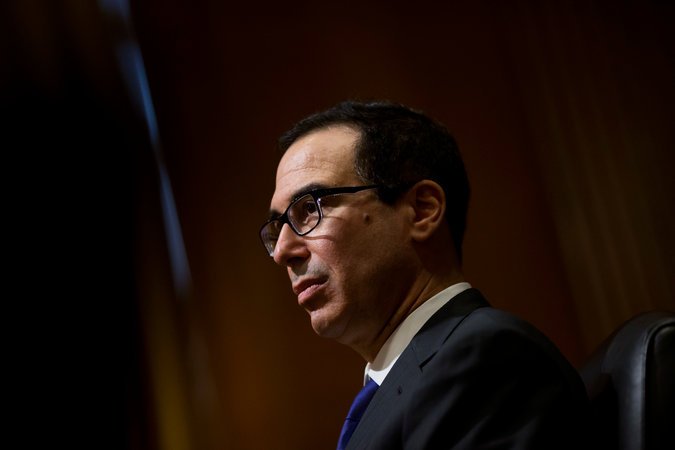John Cornyn of Texas, the No. 2 Republican in the Senate, said on Wednesday he remained concerned that the White House was not aligned with traditional Republican views on free trade.

“I think there just seems to be a difference of opinion between the president and the White House on that topic, and the rank-and-file Republicans,” Mr. Cornyn said. “I have been concerned and I am still concerned about NAFTA,” he said, referring to the North American Free Trade Agreement.
Senator Orrin G. Hatch of Utah, who worked closely with Mr. Cohn to pass the $1.5 trillion tax cut, called the departing adviser a “heavy weight” whose “keen instincts, wisdom and talent will be sorely missed in this administration.”
The advisers who remain could struggle to push Mr. Trump in a more free-market direction: Steven Mnuchin, the Treasury secretary, has shown little appetite for bucking the president on big issues. Kevin A. Hassett, the chairman of the Council of Economic Advisers, joined the administration several months in and does not appear to enjoy the profile within the White House that Mr. Cohn did.
Like Mr. Cohn, Mr. Mnuchin is a Goldman Sachs alum with roots in progressive enclaves such as New York City and Los Angeles who believes in free trade and a pro-business economic agenda. The two men worked closely together to shepherd the tax bill and Mr. Mnuchin often tries to be a moderating force, attempting to calm markets and smooth Mr. Trump’s provocative policy instincts.
But unlike Mr. Cohn, Mr. Mnuchin has not shown a willingness to publicly break with Mr. Trump and instead defends him. That tendency was on display this week when Mr. Mnuchin testified before Congress and insisted that he did not want to see a trade war. But when pressed about Mr. Trump’s controversial tariffs on steel and aluminum, Mr. Mnuchin said he was fully behind them. In an interview with Fox Business on Wednesday morning, he said he was confident the tariffs would not hurt economic growth, as many economists have warned.
“We’re comfortable that we’re going to manage through this so that it is not detrimental to our growth projections,” Mr. Mnuchin said.
Advertisement
Continue reading the main story
Mr. Cohn’s departure comes amid the ascendence of advisers who have urged the president to take tougher action on trade. Peter Navarro, a trade skeptic who had been sidelined by Mr. Cohn, has been promised a promotion and made the rounds on Sunday talk shows to promote Mr. Trump’s trade policy. Commerce Secretary Wilbur Ross, who oversaw an investigation that led to the tariffs, succeeded in moving up the announcement even as Mr. Cohn sought to delay it. Robert Lighthizer, the United States trade representative, has become a trusted adviser to the president.
Those advisers have a much more binary view of trade, seeing it as a zero-sum game in which the United States is losing. They have pushed the president to withdraw from deals like Nafta unless trading partners agree to sharp concessions and to implement the type of stiff tariffs that he seems prepared to impose on steel and aluminum imports. Mr. Cohn has argued against some of the tougher positions that economists and businesses say could disrupt global supply chains, drive up costs for American businesses and hurt consumers.
The rise of the populist faction is already fanning fears on Wall Street and among foreign officials that Mr. Trump could start and escalate a global trade war or take a more combative stance toward trading partners and international groups like the World Trade Organization. Foreign officials viewed Mr. Cohn as a reliable ally on global economic issues and someone who could express their views to the president.
Pierre Moscovici, the European commissioner for economic and financial affairs, said in a tweet on Wednesday that Mr. Cohn was “a solid, constructive interlocutor for me in the @realDonaldTrump administration.”
Gary #Cohn was a solid, constructive interlocutor for me in the @realDonaldTrump administration. We may not have agreed on everything, but I fully respect his consistent views on economic matters and his decision to leave the @WhiteHouse.
— Pierre Moscovici (@pierremoscovici) March 7, 2018
Mr. Cohn’s departure leaves almost no one in Mr. Trump’s inner circle who would champion sharp reductions in federal safety net spending, as Mr. Ryan, Mr. McConnell and many business groups favor, in order to reduce the growing budget deficit. It could affect implementation of the new tax law and reduce the already small odds of congressional leaders advancing bipartisan immigration and infrastructure bills this year.
“We can only hope to have as great of a working partnership with the next director of President Trump’s National Economic Council,” said Joshua Bolten, the president and C.E.O. of the Business Roundtable.
Perhaps the only silver lining for business groups is that the shift is unlikely to slow Mr. Trump’s drive to freeze and roll back federal regulations, which those groups love. Mr. Trump’s budget director, Mick Mulvaney, and several of his cabinet secretaries, including Scott Pruitt at the Environmental Protection Agency, remain fierce advocates of deregulation.
Nervous Republicans said on Tuesday that they would watch Mr. Cohn’s team at the N.E.C. closely as he departed. Many of Mr. Cohn’s deputies came from Capitol Hill and share the more traditionalist philosophy. If they were to leave, it would be a potentially ominous sign for like-minded Republican lawmakers.
Continue reading the main story
Article source: https://www.nytimes.com/2018/03/07/us/politics/gary-cohn-leaves-white-house-trump.html?partner=rss&emc=rss
Speak Your Mind
You must be logged in to post a comment.